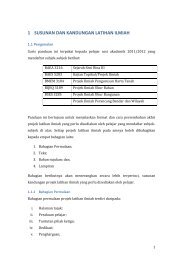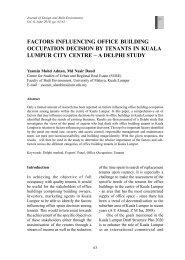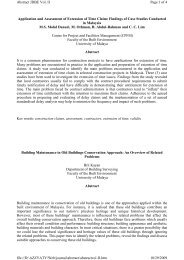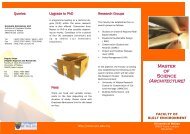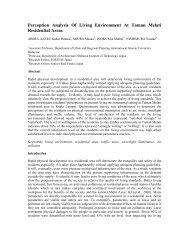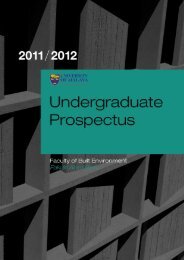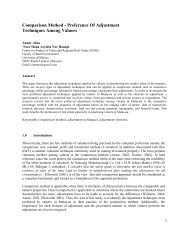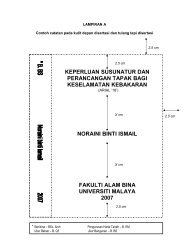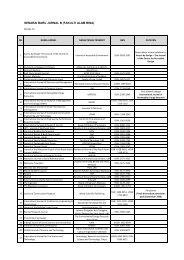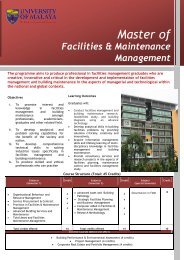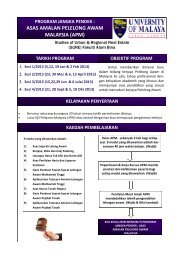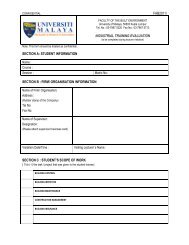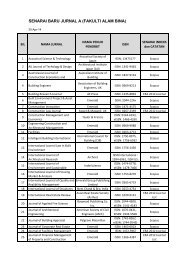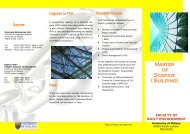Bachelor of Quantity Surveying - Faculty of Built Environment
Bachelor of Quantity Surveying - Faculty of Built Environment
Bachelor of Quantity Surveying - Faculty of Built Environment
You also want an ePaper? Increase the reach of your titles
YUMPU automatically turns print PDFs into web optimized ePapers that Google loves.
<strong>Faculty</strong> <strong>of</strong> <strong>Built</strong> <strong>Environment</strong> > Undergraduate Prospectus > 21<br />
Assessment:<br />
Continuous Assessment 30%<br />
Final Examination 70%<br />
S<strong>of</strong>t Skills:<br />
CS1, CS2, CS3, CT1, CT2, CT3, CT4, TS1, LL1, LL2, LL3, EM1, EM2<br />
BQES 3202<br />
3 credits<br />
CONSTRUCTION ECONOMICS II<br />
Synopsis <strong>of</strong> Course Contents<br />
This course extends the students’ knowledge on construction and building economics that<br />
includes design variables, cost planning and control, cost data, cost indices, costs-in-use, cost analysis<br />
and risk analysis for construction projects. The structure <strong>of</strong> the construction industry, demand and<br />
supply <strong>of</strong> houses and housing policy is also part <strong>of</strong> the course content. Students are exposed to the<br />
roles <strong>of</strong> the private and public sector and the development <strong>of</strong> economics. It also covers contemporary<br />
aspects <strong>of</strong> construction economics, such as the concepts <strong>of</strong> whole life value and costing, economics for<br />
sustainability and green building, and economic evaluation.<br />
Learning Outcomes<br />
At the end <strong>of</strong> the course, students are able to:<br />
1. identify the framework <strong>of</strong> the development process and the contemporary aspects <strong>of</strong> construction<br />
economics relevant to the built environment;<br />
2. explain the financial implications and contractual liabilities <strong>of</strong> cost planning and control, procurement,<br />
tendering <strong>of</strong> the built environment and contemporary aspects <strong>of</strong> construction economics;<br />
3. demonstrate knowledge <strong>of</strong> construction economic theory and the contemporary aspects relevant to<br />
the built environment; and<br />
4. apply the theory <strong>of</strong> construction economics and contemporary issues relevant to the construction<br />
industry.<br />
Assessment:<br />
Continuous Assessment 30%<br />
Final Examination 70%<br />
S<strong>of</strong>t Skills:<br />
CS1, CS2, CS3, CT1, CT2, CT3, CT4, TS1, TS2, LL1, LL2, KK1, KK2, EM1, EM2<br />
BQES 3203<br />
3 credits<br />
CONSTRUCTION LAW II<br />
Synopsis <strong>of</strong> Course Contents<br />
This course focuses on construction contract namely forms, formation and obligations <strong>of</strong> parties involved.<br />
It includes the relevant provisions in the standard forms <strong>of</strong> contract emphasizing on legal standpoints<br />
surrounding those provisions. This course refers to the relevant case law and provisions in the local and<br />
international standard forms <strong>of</strong> contract.<br />
Learning Outcomes<br />
Learning Outcomes<br />
At the end <strong>of</strong> the course, students are able to:<br />
1. define the forms and formation <strong>of</strong> construction contract, and obligations <strong>of</strong> parties involved;<br />
2. describe the knowledge on construction contract and clauses in standard forms <strong>of</strong> contract;<br />
3. demonstrate the ability to give views that are pr<strong>of</strong>icient, logical and pr<strong>of</strong>essionally sound with regard to<br />
the legal aspects surrounding standard forms <strong>of</strong> contract provisions in all forms <strong>of</strong> communication; and<br />
4. identify problems related to legal aspects surrounding standard forms <strong>of</strong> contract provisions and to<br />
evaluate strategic choices in arriving a decision with supporting evidence and judgment.<br />
Assessment:<br />
Continuous Assessment 30%<br />
Final Examination 70%<br />
S<strong>of</strong>t Skills:<br />
CS1, CS2, CS3, CT1, CT2, CT3, CT4, TS1, TS2, LL1, EM1, EM2



